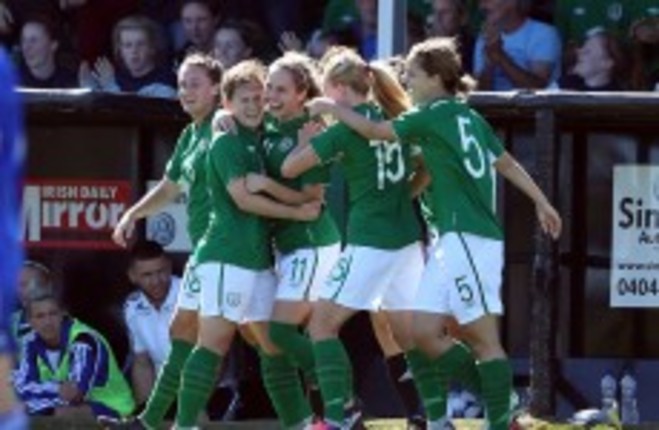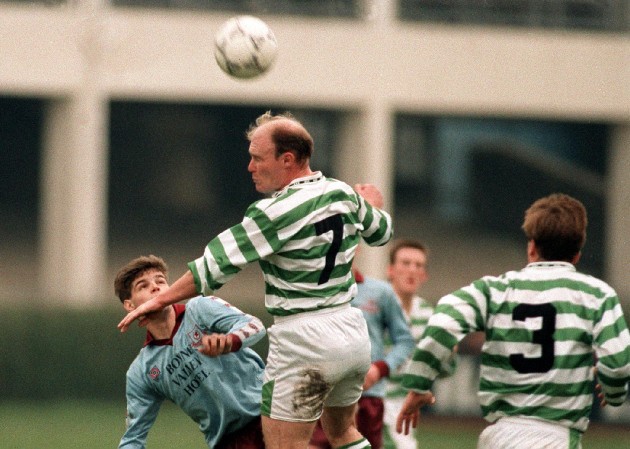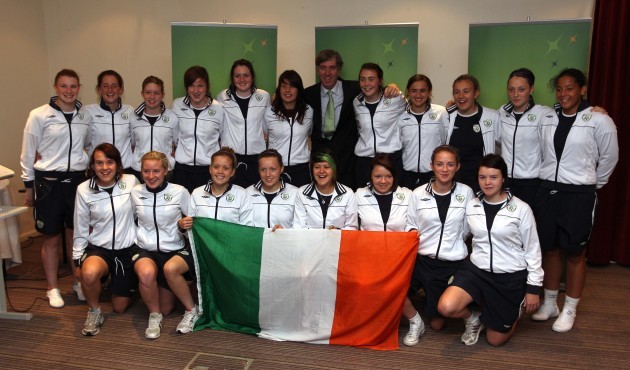‘WHY DO WE fall? So we can learn to pick ourselves up.’
The above quote is from Batman Begins, but it could just as easily apply to Dave Connell’s Irish under-19 women’s team.
Last year, they missed out on qualification for the European Championships in heartbreaking circumstances. Needing only a draw in the final qualifying game against holders Sweden, they were beaten by two goals in the final 20 minutes, despite looking the better side for the majority of the contest.
This year, the under-17 women’s team, whom Connell also manages, suffered similar agony, missing out on qualification on goal difference.
Yet despair turned to ecstasy recently for Connell and the Irish under-19 side, who showed considerable character to recover from last year’s major disappointment. On 10 April 2014, they secured a 1-0 victory over Turkey to guarantee their place at the UEFA WU19 Championships elite qualifying round.
To put the scale of the achievement in context, approximately 23,000 women play football in Ireland. Meanwhile, Germany, who didn’t qualify, have roughly 1.2 million women playing the game.
All of which means that Ireland will travel to compete in the tournament in Norway this July, with the hosts, in addition to Holland, England, Spain, Scotland, Sweden and Belgium.
One of the people behind this incredible success is manager Dave Connell. Connell was a player with several clubs in the League of Ireland, including Bohemians and Shamrock Rovers, before becoming a manager in the league, first with Limerick and then at Galway United in the early 00s.
In 2011, Connell was appointed manager of the Irish under-19 women’s team, having worked as an FAI development officer for a number of years, while serving as assistant boss to Sue Ronan, the current manager of the women’s senior team.
Connell gave himself and his team a target of four years to reach a major tournament. The Turkey win meant he achieved this aim with 12 months to spare.
“I think it’s important as a coach that you set your targets just as the players do,” he tells TheScore.ie. “It keeps me on my toes and it keeps the staff on their toes.
“It was probably a combination of hard work and last year’s disappointment, because 10 of the players from last year were eligible this year to play and it was certainly their target to try to get to the finals.”
Having troubled illustrious opponents such as Sweden and Spain in recent times, Connell and his side knew that they weren’t far off the level to which they aspired to reaching.
(This goal by Stephanie Roche, which went viral, did much to enhance the profile of Irish women’s soccer)
And while previous near-misses were undeniably gut-wrenching, their encouraging performances provided the team with a level of self-belief and renewed determination that ultimately paid dividends.
“They realise that there’s no one out there that we should fear. The penny’s dropping that we’re actually a good side and we have a lot of qualities that other countries don’t have.
“Obviously, we have a lot of girls who are willing to work very hard. That’s built into the girls and the boys. And so we worked on getting them organised and scoring goals, which is obviously very important, but probably the most impressive thing about this year’s elite phase was that we didn’t concede a goal. Now we only scored two, but it’s a motto of ours that if you don’t concede, you don’t lose games. We built on that and the girls have been very good and very hard-working to achieve that in every game.”
Playing against teams with far greater populations and resources, Connell makes no apologies for the pragmatic style his team often adopt. Ahead of this summer’s tournament, they have been paired in a group with Spain, England and Sweden — three of the favourites to win the competition — and so, it would hardly be wise to come out with all guns blazing.
“Myself and my staff have learned how to get to finals over the years. At the start, we were playing very attractive football, but we were losing games. We made a conscious decision on what way we were going to play. Yes, the girls can still play and we encouraged the girls to play good football, which at times they have, but we’re conscious of not conceding goals.
“UEFA did an interview at the draw and they asked me my objective for the finals, and my objective is to win the finals. We don’t fear anyone and we won’t make it easy for anybody.”
Such optimsim has been backed up by performances on the pitch of late. Last March, the Irish team were invited to take part in a pre-tournament event in La Manga. With 10 countries taking part, including the US, who are renowned as a powerhouse of women’s football, Ireland finished joint third, gaining revenge in the form of victory against Sweden — the team who dumped them out of last year’s Euro qualifiers — along the way. Indeed, they went the entire tournament unbeaten, also drawing with Denmark and England.
“To me that event was the key this year,” Connell explains. “Not only off the pitch, but certainly on the pitch, the girls bonded very well. I introduced six under-17 players into the squad from the first stage and it was a good mixture with our experienced players. There wasn’t as much pressure going into the elite in Holland, and in our first game, England played us off the park in the first half. We made a couple a couple of positional changes during the game and we absolutely destroyed England in the second half. So it was a game of two halves and that game turned it for me.”
(Connell played for a number of League of Ireland teams, including Shamrock Rovers, before going into management)
While women’s football is not quite on a par with men’s in terms of ability for a number of reasons, the dedication of those involved means the contrast is not as stark as some people might imagine. Considerable hard work and preparation goes into planning for each game, as Connell outlines:
“We work closely with the video analysis person within the team. I have my own video analysis person as well. All these people are doing this stuff voluntarily — they’re development officers. They come in and it’s not only for big tournaments. We get our training sessions recorded. We look at these and we study the way we play. We certainly study the way the opposition play, so we’ll look at the DVDs of England, Spain and all our opposition. We’d have scouts at all the matches before the finals, so we’d be well prepared in that department.”
With the under-19 team currently enjoying such success, it seems inevitable that more than a few will make the step up to senior level. Indeed, some of them have already experienced a small taste of what it’s like to be part of the senior set-up.
“Sue [Ronan] had some of them in. She does a mixture of physical and technical stuff once a week, and some of the 19s players have fed into that. Unfortunately, Claire Shine broke her leg, Katie McCabe, one of the stars of the women’s national league, also missed the elite phase with a broken leg. Katie is on the road to recovery, and we’re optimistic Claire will make it for the tournament as well.
“But Sue is well aware of who’s coming through and I’d certainly be optimistic that a few will break through in the near future.”
Moreover, given that he’s in the relatively unique position of having coached at a high level in both the men’s and women’s game, does Connell see a contrast between the two in any particular areas?
“The girls would be a lot more level-headed than the lads,” he says. “We’ve 10 of them doing their Leaving Certs, so they’re very conscious about their studies. And obviously, the same rewards aren’t in the women’s game as in the men’s.
“I brought in Sean Byrne, who worked with me at Shamrock Rovers, and who would have been an established A-license coach at the time. He could not believe the difference of working with the women and the men. Dave Bell, my assistant, managed in the lower divisions in England and he prefers to work with the women because of their attitude — there are very few girls that have an attitude problem. They’re certainly easier to handle.
“They’re very honest about what they want to achieve. We’d be helping as many of the girls as we can with scholarships. A lot of them want to go on to university and colleges here encourage under-age international players into the college. So we’ve good ties with colleges around the country. The system within Ireland has certainly gotten stronger, so there are a lot more opportunities. We’ve a couple on UCD scholarships, as does Sue. UCC and Carlow IT have a few as well. With the education system here in Ireland, that’s what we want.”
(Highlights from the Ireland under-19 team’s recent match in La Manga with Sweden)
Connell describes how keeping players in Ireland, and in particular, away from the temptations of American colleges, has been a fundamental part of their recent success.
“In the past, a lot of people did go to the US and getting them back in from America is costly. We can also keep a closer eye on them in Ireland and a lot of people are going down that path now. We’re optimistic we can hang on to our younger age players here in Ireland. But we’d certainly encourage them to go and play in the Super League in England. Again, we have a very good women’s national league that’s growing all the time and we look for our better players to play.”
He also says that the fitness levels of players have improved immeasurably over the years, as a greater level of preparation has been introduced into the women’s game.
“We looked at the women’s game around Europe. We’d obviously like our clubs to be doing a little bit better, but in saying that, the women’s game is only established now. It’s growing and we have a certain way of playing, and our girls have to be fit to play that. There were a lot of fitness issues with the girls, a lot of strength and conditioning issues.
“Technically, we were okay with the best in Europe, though we weren’t right up there. But physically, we weren’t at all and the girls have worked at that. They’re all on individual programmes, so there’s no hiding place. We have every little bit of detail covered and the girls are expected to do this now. We’re in a position now where we can say to players, ‘you’re not good enough because of x, y and z’. We weren’t in that position a few years ago. And I treat the girls exactly the same way as boys in terms of training methods and what I expect from them. I don’t treat them any different to the men’s players I managed in the League of Ireland.”
And while both participation levels and resources are constantly improving, Ireland still lags behind somewhat in comparison to the top countries such as France, where considerable finances have been injected into the women’s game, to an extent that players train and study together in the same vicinity on a daily basis. However, Connell expresses hope that “maybe that’s down the line for us”.
Furthermore, having started out with the FAI as a development officer, encouraging kids from disadvantaged areas to play football, Connell has an intimate knowledge of the game from grassroots level upwards. As national co-ordinator for the girls’ emerging talent programme, he delegates a number of scouts to travel around the country to select the most promising individuals on display. “I oversee that, so there’d be very few creeping under the radar,” he confidently proclaims.
(John Delaney poses for a picture with the Ireland under-17 team at their World Cup homecoming)
Yet despite the impressive scouting system and improving results, Connell maintains that it is not only the players who must continue to strive for excellence.
“The standard of coaching needs to be improved,” he admits. “We need our coaches to buy into coaching models. We’re happy to say we’re upgrading our coaches to the best we can. We have coaching workshops throughout the year.
“It’s about the philosophy of the coach coming in. We like to play football and we like to mix it up, but people would be pleasantly surprised by the manner in which we play. We’re not perfect, I’m not the perfect coach, but we work very hard.
“We’re constantly in touch with league centres, as regards any help that we can provide. We have an open policy where any coach who works on league centres is welcome to attend our training sessions.
“We’re trying to help as many people as we can, we’re trying to embrace the way we’re playing. It’s an area that I did feel needed to be upgraded, and we’re in the process of upgrading more and providing the B license. There’s no doubt we’re a little bit behind, but we’re getting there.”
In addition, Connell is grateful to FAI Chief Executive John Delaney for treating the women’s game with respect.
“Certainly, over the last few years, women’s football in Ireland has taken off and hopefully, the girls getting to the finals will give us a higher profile. Financially, the FAI have put a lot into the women’s programmes and obviously, a lot of them are paying off. Financially, in fairness to John Delaney, he treats the women’s game exactly the same as the men’s game. He’s put a lot of emphasis on that and we’re seeing the benefits of it now.”
The UEFA European Women’s Under 19 Championships takes place this summer between 15 and 27 July. Ireland start their campaign on the opening day against Spain.



